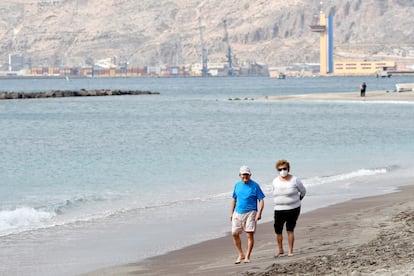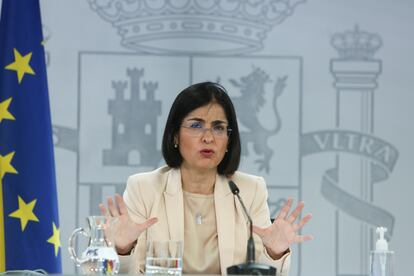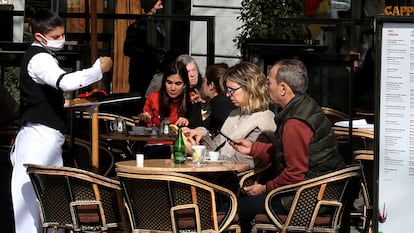Why Spain is heading toward an Easter week with no inter-regional travel
Most of the country’s regional governments are in favor of perimetral lockdowns during the spring break, with the Health Ministry seeking a countrywide agreement on restrictions

Spain is approaching an Easter week with restrictions on movement between regions in place. The majority of regional governments are in favor of leaving perimetral lockdowns of their territories in place. These are in force in all areas, apart from Madrid, Extremadura and the Balearic and Canary islands. The Health Ministry is studying a common plan that would be implemented across the country, and is seeking support to back it from the regions, according to the Castilla-La Mancha health chief, Jesús Fernández.
Via a spokesperson, the Health Ministry itself referred to the words of its minister Carolina Darias, from last week: “The objective is to get down to 50 cases [per 100,000 inhabitants over the last 14 days]. It is easy for that number to go up and difficult to get it down. We are focused on protecting the health [of the population] and continuing saving lives. [We are calling for] prudence, responsibility and common sense. We are on a good path, but we cannot be overconfident. We are in the midst of the vaccination process, which is speeding up and it’s important that everything goes well.”
According to the latest data from the Health Ministry, Spain’s 14-day cumulative number of coronavirus cases per 100,000 inhabitants is 168.44, and while it would not be impossible to get below 50 cases in four weeks, it will be complicated at the current rate of descent. The data point has not been so low since the end of July.
The ministry’s comments echo those of Fernando Simón, the director of the Health Ministry’s Coordination Center for Health Alerts (CCAES). Speaking on Monday to present the daily coronavirus report, he said: “I’m an epidemiologist, and I’m interested in keeping the epidemic under control. Obviously, my visions are different from those that a businessman, for example, could have. If the transmission conditions are not correct for there to be a little more of a reopening, I believe that it should not even be considered,” he stated.

This same message was backed on Tuesday by government spokesperson María Jesús Montero, speaking after the weekly Cabinet meeting. She also called for “prudence,” for there not to be an “abrupt” deescalation in order to avoid a fourth wave of the pandemic.
Adding to this chorus of voices was the Andalusian regional health chief, Jesús Aguirre of the conservative Popular Party (PP), who said on Monday during a radio interview with the COPE network that the relaxation of coronavirus restrictions should be “possibly smaller than is being considered,” given that the curve of the epidemic is heading toward a “plateau,” albeit with “very high numbers of hospitalizations” and intensive care unit (ICU) admissions.
We are on a good path, but we cannot be overconfidentHealth Minister Carolina Darias
Adrián Barbón, the Socialist Party (PSOE) premier of Asturias, also voiced his support for restrictions this Easter. “Asturias is planning to maintain the perimetral closure [of the region] while the state of alarm is in force,” he said, in reference to the emergency powers the central government put in place that allow the regions to put limits on mobility without facing challenges in the courts against such restrictions. “We need to burst the bubble of whether we can enjoy Easter week like we did Christmas,” he continued, in reference to the spike in infections, hospitalizations and Covid-19 deaths that followed increased social activity in December and January. “If we want to fall to objective levels of public safety we need to sacrifice Easter week,” he concluded.
Madrid, meanwhile, which currently is not under a perimetral lockdown, has distanced itself from this position. But its regional premier, Isabel Díaz Ayuso, has not made a definitive announcement about its approach. “What we are doing is bringing together health and life,” she has said. “The economic engine of Madrid cannot stop and must seek sensible and balanced measures that marry up both factors. We will see how the situation progresses in order to protect lives and to not put our battered economy in even greater danger.”
During the pandemic, the Madrid regional government has often been at loggerheads with the central administration, which is led by the Socialist Party (PSOE) and junior partner Unidas Podemos. In the autumn of last year, this led to the central government intervening in the region to introduce stricter coronavirus measures in the face of Ayuso’s refusal. The regional government, which is run by the PP in coalition with center-right Ciudadanos (Citizens) and propped up by far-right Vox, has also opted not to follow the lead of other regions and close bars and restaurants during the third wave. Madrid’s 14-day cumulative number of coronavirus cases per 100,000 inhabitants is 273.39 according to the latest Health Ministry report, the worst of all 17 regions and the only territory that is still over the 250-mark considered “extreme risk” by the Spanish government.

Ayuso added this week that it is “a bit early still” to clarify the region’s approach to Easter. “Madrid is suffering major [economic] stoppages,” she continued. “I hope that Easter week allows us to recover somewhat. We have to be sensitive to this need,” she concluded.
Other regions are also opting to see how the data progresses. In Catalonia, the regional government’s spokesperson Meritxell Budó said on Tuesday that her administration was “starting to work” on the planning of a “calendar” for restrictions over Easter, in order to give the hospitality sector a framework of what to expect.
The Galician premier, Alberto Núñez Feijóo, responded similarly when asked last week about Easter. “Whoever is making predictions does not know how this virus works,” he said. Aragón’s regional government said something similar via a spokesperson: “It’s still early to take such a decision. In Aragón the data is being analyzed from day to day and we have to be prudent so as not to create false expectations.”
The Canary and Balearic islands, which have among the lowest infection rates in Spain, are not considering closing their borders for Easter, and will continue to require negative test results for arrivals. But if the rest of Spain is to close its borders, the practical effect will be that only foreign arrivals will be able to travel to the islands.
English version by Simon Hunter.
Tu suscripción se está usando en otro dispositivo
¿Quieres añadir otro usuario a tu suscripción?
Si continúas leyendo en este dispositivo, no se podrá leer en el otro.
FlechaTu suscripción se está usando en otro dispositivo y solo puedes acceder a EL PAÍS desde un dispositivo a la vez.
Si quieres compartir tu cuenta, cambia tu suscripción a la modalidad Premium, así podrás añadir otro usuario. Cada uno accederá con su propia cuenta de email, lo que os permitirá personalizar vuestra experiencia en EL PAÍS.
¿Tienes una suscripción de empresa? Accede aquí para contratar más cuentas.
En el caso de no saber quién está usando tu cuenta, te recomendamos cambiar tu contraseña aquí.
Si decides continuar compartiendo tu cuenta, este mensaje se mostrará en tu dispositivo y en el de la otra persona que está usando tu cuenta de forma indefinida, afectando a tu experiencia de lectura. Puedes consultar aquí los términos y condiciones de la suscripción digital.









































